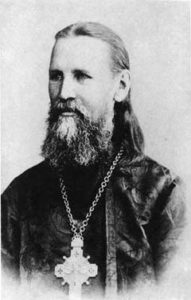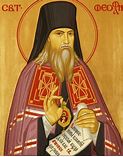SSCORRE!
Saint Sophia Cathedral
Online Resources for our Religious Edification
Topic of the Week – Going Deeper Lecture – Part III
Question: …We’ve generally become uncomfortable with saying things like ‘only in the Orthodox Church do we have the fullness…’ this little spirit of ecumenism.
Fr. Peter: It’s an identity problem, it’s an identity complex… we’re afraid to say ‘we are this’. We’re beginning to doubt our own identity as Orthodox Christians, that’s a fruit of ecumenism.
Q: What does the word ecumenism come from?
The word ecumenism comes from the word ‘οικουμενισμός in Greek so you have… universality would be another translation. Ecumenical means something universal. The ecumenical movement was the movement that was designed historically to bring all of these Christians together. Oikoumenoi is the whole world, in Greek.
This is the idea that we’re trying to unite worldwide all the Christians into one thing. It started with the Protestants in the 19th century. Actually it started long before the World Council of Churches was founded, it started among Protestants in the mission field in Africa, Asia. How did it start? Well, they were sent by their various denominations and they’re in Africa and there’s a Methodist over here and about 5 miles down the road there’s an Episcopalian or Baptist and they’re making converts, they’re making progress. They did make MUCH progress in the 19th century. Amazing progress, the Protestants made in the 19th Century in mission. But what happens is that the people who have been missionized who are of one tribe or one nation, they start to look around and say ‘well, you’re not with me, we’re not unified’ and yet they’re both Christians. And they start to say to the missionaries, ‘well, what’s wrong with you people, you’re not united? You should be united. I don’t want to be separated from my cousin down the road or my friend over here.’
So the Protestant missionaries turn around and say ‘this is a disgrace we don’t have unity’ and they go back and send letters back to Edinburgh and Scotland and to London and to New York, and to the various headquarters and they say ‘you have to start doing something. We can’t do mission work this way. It won’t work. Ultimately it’s going to crumble. There’s no unity, it’s a disgrace and it’s a bad witness.’
That’s how ecumenism started, in the 1840’s, ‘50’s, ‘60’s, ‘70’s. It also started after that with the student union movements; the YMCA, and these other groups. These were also attempts probably initiated through the missionaries, I don’t know the exact origin of all these groups, but it was this idea that ‘We can’t do mission. We can’t do the work of the church if we’re not united.’ So it was all about witness. It wasn’t about truth. It was all about how are we going to witness. Truth was a secondary question among the Protestants because doctrinally they actually say it straight out, some prominent missionaries in the 1840’s, ‘80’s, ‘90’s, they say ‘Doctrine is an obstacle to unity…. Doctrine divides.’
So here we are 1910 the first student youth union movement… I think it was called student unions YMCA…. First time in Constantinople. They go to the Orthodox and they get the Orthodox involved. And they come back and they’re just glowing. ‘The Orthodox are with us. The Orthodox want to partake’ And it was the Ecumenical Patriarchate. And in 1920 we have the first Comity agreement. What does that mean? It’s an agreement NOT to proselytize one another, between the Ecumenical Patriarchate and Protestant missionaries. And a prominent theologian from Athens… that is one of the pillars of ecumenism, don’t proselytize the others; we’re all one.
You can already see the problem here in terms of Orthodox doctrine of the church. 1920 we have the famous encyclical to all the Christians on the earth, all the churches of Christ, it’s actually entitled. Encyclical of the Ecumenical Patriarchate to All the Churches of Christ in the World. And in there, the author Metropolitan Germanos is believed to be the author. He was one of the Orthodox bishops who were doing a lot of work in the West, he’s the main author, I think. He writes that using St. Paul’s description of the body, there being many parts of the body. I’m not sure I’m quoting it correctly, but the idea here is that he likens every local church to a part of the church. He implies that all these local churches, not the Orthodox Churches, he’s writing to every… Protestant, Roman Catholic… are ALL a part of the church. That’s the first time in an encyclical that it’s implied that the Orthodox Church is not the catholic [meaning it has all the truth and contains all the revelation, NOT meaning Roman Catholic] Church.
Now he might say that’s not how we interpreted it, but that’s certainly how the Protestants interpreted it. And that begins the Orthodox involvement essentially in the 1920’s you have Orthodox theologians going to the Life and Works, and Faith and Order meetings in Europe. They’re the precursor to the World Council of Churches which is the worldwide ecumenical body and they begin to dialogue with the Protestants and in the beginning for about 20-30 years most of the statements remain true to Orthodox ecclesiology except the main statement in 1948 which has a serious problematic aspect to it which seems to be very much akin with ecumenism.
So you see, I don’t want to get too much into it because it goes on and on but the key here is that this movement that pre-existed among the Protestants, WE entered in on THEIR basis, their basis they had already created. We didn’t re-create, we didn’t say ‘change it and then we’ll enter’. We enter in on their presuppositions which are Protestant presuppositions of a divided church and we work within those.
“…What is the heresy* of ecumenism?… a distortion of the nature of the church as a (theanthropic) God-human organism…. We make it into a human organism or we distort it in a variety of ways….
It’s essentially an attack on Christ…. The Church is… the way to the Father, so if he can nullify this in the world and make it a part of the world or he can make it something that’s been defeated because it’s been divided, and the minute the Church is divided, it’s defeated. Christ cannot be divided Saint Paul says. Is Christ divided? No, obviously – He never can be divided.
…the other thing that it does is it blurs or denies or overturns the boundaries of the Church. That’s another way that it overcomes or overturns this reality of the Church. We use the term boundaries. You probably don’t know that this term is the same term used when we talk about the decisions of the Ecumenical Councils. In Greek it’s called όρος. It means ‘boundary’.
So the minute you deny one of those things, you’ve denied the boundaries… you’re blocking the way to salvation for humanity. This is the temptation in the Book of Revelation that will come upon all the Earth. They will no longer be believing in the divine-human nature of Christ, in His Church. It’s one in the same. The Church is not anything but Christ Himself. Christ is the head, and it’s his body, the Church is Christ. So if you’re denying the oneness of the Church, the catholicity meaning it has all the truth and contains all the revelation, there’s nothing missing, nothing lacking, that it’s apostolic. That means the preaching and the teaching and the life of the Apostles is the life of the Church. It’s one, it’s not divided. If you deny any of that, you’re actually overturning the… person of Christ. You’re overturning access to the person of Christ.
So the boundaries that were laid down, were laid down precisely so that you know and I know in those is where I work out my salvation. And there I’m in communion with God. That’s where you find Christ. That IS Christ, the true Church.
Yes, everyone needs to come and fulfill the presuppositions of faith and repentance, to participate… you can participate but you’re not going to have any fruit. So that’s the difference between one who is in the Church and one who is outside the Church. It’s impossible outside the Church to participate in the mystery of Eucharist and the incarnation. Whereas in the Church, of course, you can participate, but the fruits will be not forthcoming without this repentance and this faith. So it’s different. I don’t want to imply that in the Church there is any kind of doctrinal relativism. But it’s a kind of laxity that does along with the spirit of ecumenism generally.
Mixed marriages would be a problematic… possibly, possibly. There is an extreme economia and it has existed in the Church for about 100 years for mixed marriages. However, there’s no theological, dogmatic basis for mixed marriages. Any time I’ve asked anyone who’s a theologian in Greece, please give me the basis for mixed marriages, there is none. It is simply economia. That. Can’t. Be.
Now, I’m going to tell you the akrivia of the Church and I’m not going to call into question any practice of your priest or your bishop, that’s their call. Economia is in their hands. They have to wield it and they will account for it and I’m not accusing any of them. But as a theologian, I’m telling you in a theoretical way, what is going on with this question of mixed marriages.
Q: One of the major dioceses in North America did a study on mixed marriages and they proved that almost, in the vast majority, that the Orthodox person ends up leaving the Church.
FP: Really?
Q: Typically, statistically, the majority of people who are marrying an Orthodox person and didn’t want to become Orthodox had a strong religious orientation. Well, we extend economia to them, well, who’s the spiritual center in the household? It’s the person that stood for their faith.
FP: And didn’t want to become Orthodox.
Q: And didn’t want to become Orthodox, and their spirit ends up dominating the house and eventually the Orthodox….”
…People generally don’t consider these things because we’re looking at it on a human, personal level; we have friends, we have relatives, we might even be in the situation and we don’t consider the larger picture on the basis of the dogmas of the church…. It doesn’t lead to salvation…
Excerpted from https://www.slocc.com/
_____________________________________________________________________________________________________________________________________________
A Message from Maria Spanos
I am passionate about our Orthodox Christian faith and seek to help others learn as much as they can about it. My purpose here is to share online resources that help strengthen our relationship with Christ and bind us closer to His Church. I believe they are invaluable in learning about our precious Orthodox Tradition, and are a great aid for teaching family members, friends and others about Orthodoxy. ~Maria
Two of my favorite quotes:
 “A true Christian behaves in this life so that it may be a preparation for the future one and not only a life here below. In his actions, he does not think what will be said of him here but of what will be said there in heaven; he represents to himself that he is always in the presence of God, of the angels and all the saints, and remembers that someday they will bear witness of his thoughts, words, and deeds.” — Saint John of Kronstadt
“A true Christian behaves in this life so that it may be a preparation for the future one and not only a life here below. In his actions, he does not think what will be said of him here but of what will be said there in heaven; he represents to himself that he is always in the presence of God, of the angels and all the saints, and remembers that someday they will bear witness of his thoughts, words, and deeds.” — Saint John of Kronstadt
__________________________________________________________

“Of all the holy works, the education of children is the most holy.”
— St. Theophan the Recluse







